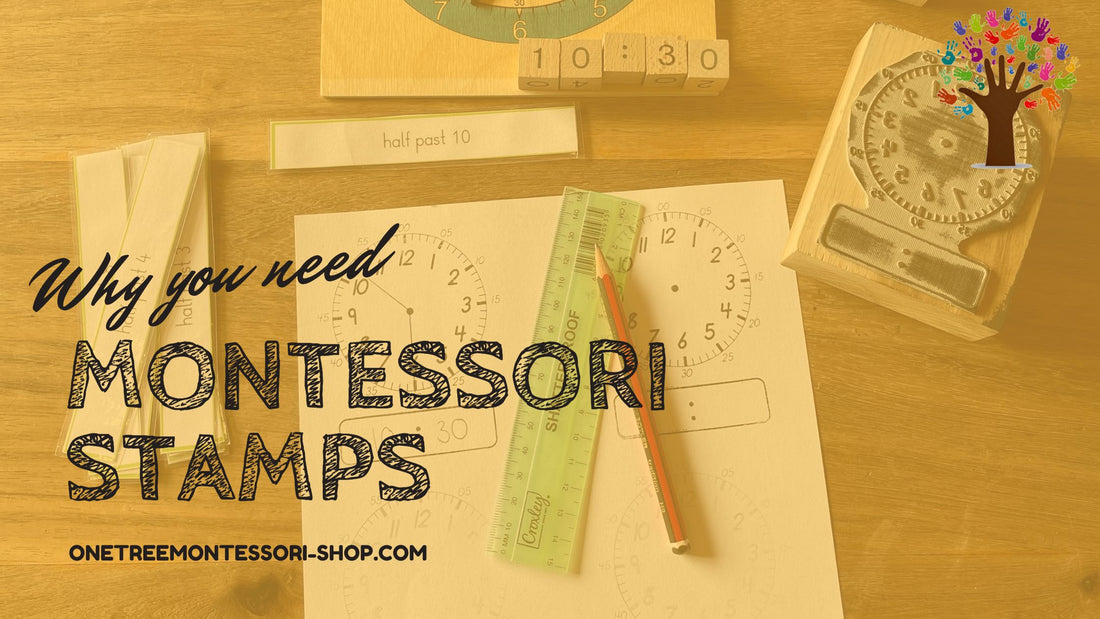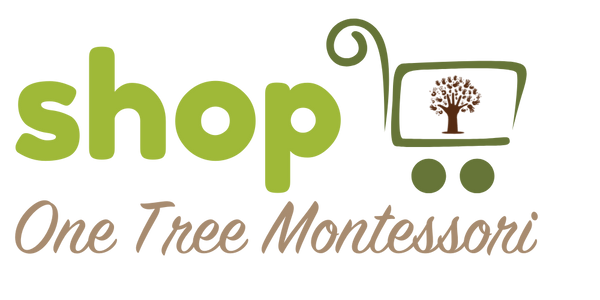
Why You Need Montessori Stamps
Share
I think stamps are magical. The satisfaction gained from leaving an immediate mark on snow-white paper ... it's unparalleled (but then I love any and all stationery).
It's safe to say, though, that children love stamps, too. What better way to extend their learning, than with crisp images of their favourite materials that they can create at will?
If you have Montessori stamps, or are thinking about buying them, this article shows you how to use them!
What are Montessori Stamps?
Montessori stamps are rubber stamps, normally with a wooden handle (although I've seen self-inking ones) that are used to make often-used materials a little more abstract, and a little more accessible.
They're not to be confused with the Stamp Game (first picture), a stand-alone piece of material used for operations in Maths.


They're especially useful in the second plane (6-12 years), when children are starting to yearn for more abstract work but often still need the materials in their practise.
Montessori stamps allow them to cut down on absolutely terrible activities, like walking up and down, tracing stencils or drawing something themselves.
What Kind of Stamps do You Get?
Googling "Montessori stamps" mostly just brings up the Stamp Game; you have to be specific with what you're looking for. I have seen stamps for
- bead bars
- golden beads (or both combined)
- grammar symbols
- clocks
- money
- fractions
- thermometers
The last four aren't necessarily Montessori-specific but still really useful in the classroom. If you've come across a type of stamp I haven't mentioned, please do let me know!
Now, we're launching our very own rubber stamps (linked in the list above) on Friday, 2 December 2022. The links will only work then. If you're reading this blog after the launch, well, our stamps are available!
Do You Really Need More Stuff?
Well ... no. The stamps are not essential. You can have an amazing classroom or homeschool without them, and I would never buy stamps if there are other materials I don't have yet.
But if you have all the materials you need... and if you have any space on your shelves available at all... then the stamps can really boost the learning engagement!
I've seen it in my elementary class - we got the stamps in October 2022 and the kids continue using them with fervour.
What do You do With Montessori Stamps?
But how do you actually use these stamps to enhance the learning experience? The last thing you need is another dust-collector, so read on to find a few solid activities you can do with each of the sets we sell.
Remember, the product links will be active from Friday, 2 December 2022.
Montessori Bead Bar Stamps
Buy the Bead Bar Stamps here.
Counting & Colouring (1-10)

Simply stamp, count and colour (it may help to have the bead bars close by).
Counting & Colouring (11-99)

A great extension for the Seguin Boards, or to make numbers from the 100 Board, 100 Chain and 1000 Chain.
Addition

The children can come up with their own sums or use prepared addition exercises.
Snake Game

Create a snake (best to colour it!), then count and mark off every 10 before recording it.
Multiplication

Stamp a bead bar many times, and you've got it multiplied!
For a sensorial level, they can stamp and verbalise, for example "7 three times". A little more complex when the problem is written out, and even more challenging to count up the product.
For ambitious students, multiplying two-digit numbers is a great activity!
Subtraction

Stamp the minuend and scratch out subtrahend to find the difference.
Montessori Clock Stamp
Buy the Clock Stamp here.
Recording Time
(Excuse the skew clock hands.) Just like the bead bars, the clock stamp can be used at various levels of complexity.
Use it record times during the day to mark events. Copy work done with Clock 3-Part Cards, and eventually convert analog to digital time and vice versa.
For the adventurous, combine it with our Time Zone Bundle to calculate time differences and intervals.
Montessori Golden Bead Stamps
Buy the Golden Bead Stamps here.
Recording Concrete Quantities

Make a number and stamp it down.
Recording Abstract Quantities

Make a number with the number cards and - you guessed it - stamp it!
Writing Numbers

Stamp a number and write it down (or make it with the number cards for non-writing children).
Large Addition

Large Multiplication

Large Subtraction

Large Division

Start with the largest hierarchy and share it out. This can get quite complex with dynamic division, where the exchanging would have to be recorded in the written problem since it can't be done with the beads, but it's fun nonetheless.
Montessori Grammar Stamps
Buy the grammar stamps here.
Analysing Parts of Speech

Directed Writing
Stamp a sequence of parts of speech and let the child make a sentence for it.
Bonus: Montessori Money Stamps
Buy the Money Stamps here.
Identify Currency
Compare to the real deal, stamp it into a book and - if able - label the notes and coins.
Making Amounts

Who wants to play shop!?
Making Equivalent Amounts

In how many ways can you make N$10?
Conclusion
So many things to do with these stamps (and I'm sure I didn't cover all of them). I'd love to see how you're using our (or any) stamps, so make sure to reach out to us on social media!


